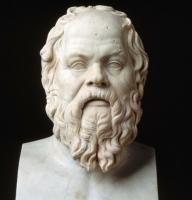Beethoven's Hymn to Joy: History, Analysis and Meaning
With the name of Hymn to joy the fourth movement of the Ninth Symphony by Ludwig van Beethoven (1770-1827), in which he musicalizes the poem by Friedrich Schiller (1759-1805) called Ode to joy (Ode an die Freude).
The Hymn to joy it has become a universal reference for music and is valued as a hymn to universal brotherhood. In fact, its influence has been so great that it has moved from academic music to pop music. For example, the version made by the Spanish singer Miguel Ríos.
The impact that the Hymn to joy from its origin it is due, in the first place, to being the first choral movement inserted within a symphony, thanks to the fact that Beethoven decided to take the liberty of "making talk" to what was his last work symphonic. Second, it is also due to the values expressed in Schiller's poem. Let's know what its history, meaning and significance are.
Friedrich Schiller's Ode to Joy (German lyrics)

Note: The italicized section has been added by Ludwig van Beethoven
O Freunde, nicht diese Töne!
Sondern laßt uns angenehmere anstimmen,
und freudenvollere.
Freude! Freude!Freude, schöner Götterfunken
Tochter aus Elysium,
Wir betreten feuertrunken,
Himmlische, dein Heiligtum.
Deine Zauber binden wieder,
Was die Mode strengthe geteilt;
Alle Menschen werden Brüder,
Wo dein sanfter Flügel weilt.Wem der große Wurf gelungen,
Eines Freundes Freund zu sein;
Wer ein holdes Weib errungen,
Mische seinen Jubel ein!
Ha, wer auch nur eine Seele
Sein of him nennt auf dem Erdenrund!
Und wer's nie gekonnt, der stehle
Weinend sich aus diesem Bund!Freude trinken alle Wesen
An den Brüsten der Natur;
Alle Guten, alle Bösen
Folgen ihrer Rosenspur of her.
Küße gab sie uns und Reben,
Einen Freund, geprüft im Tod;
Wollust ward dem Wurm gegeben,
Und der Cherub steht vor Gott.
Vor Gott!Froh, wie seine Sonnen fliegen
Durch des Himmels prächt'gen Plan,
Laufet, Brüder, eure Bahn,
Freudig, wie ein Held zum Siegen.
Seid umschlungen, Millionen!
Diesen Kuß der ganzen Welt!
Brüder, über'm Sternenzelt
Muss ein lieber Vater wohnen.
Ihr stürzt nieder, Millionen?
Ahnest du den Schöpfer, Welt?
Such 'ihn über'm Sternenzelt!
Über Sternen muss er wohnen.
Translation
Note: The italicized section has been added by Ludwig van Beethoven
Oh friends, let's drop those shades!
Let us sing more pleasant and joyful songs!
Joy! Joy!Joy, beautiful flash of the gods,
daughter of the Elysee!
Drunk with enthusiasm we entered,
celestial goddess, in your sanctuary.
Your spell binds again
what bitter custom had separated;
all men are brothers again
where your soft wing rests.The one to whom luck has granted
a true friendship,
whoever has conquered a beautiful woman,
Join your joy to ours!
Even the one who can call his own
even a soul on earth.
But who has not even achieved this,
Let him walk away crying from this brotherhood!Everyone drinks for joy
in the bosom of Nature.
The good ones, the bad ones
they follow their path of roses.
He gave us kisses and wine
and a faithful friend until death;
lust for life was granted to the worm
and to the cherub the contemplation of God.
Before God!Joyful as their suns fly
through the formidable celestial space,
run like this, brothers, on your way joyful
like the hero to victory.Hug millions of creatures!
May a kiss unite the whole world!
Brothers, upon the starry vault
a loving Father must dwell.
Do you bow down, millions of creatures?
Do you not feel, oh world, your Creator?
Look for him above the celestial vault
Above the stars he must dwell!
History and analysis of Hymn to joy
It is known to all that Beethoven has been considered the last of the neoclassical composers and the first of the romantic composers. He was, without a doubt, the architect of a great stylistic transformation in the history of music.
The neoclassical sensibility had its origin towards the middle of the 18th century, and reached its zenith thanks to the revolutionary spirit that it imprinted to culture the slogan of the French Revolution "equality, liberty and fraternity" and the proclamation of the universal rights of man in 1789.
Longing for equality, fraternity and freedom in German culture it had been expressed three years before the revolution, in 1786, when Friedrich Schiller published Ode to joy. Schiller was part of the generation of Sturm und Drang (‘Storm and impetus’), a pre-romantic movement that claimed those values through the arts.
Beethoven was not far from it. Researcher Rivas Vergara insists that:
... the creative experience of art played a fundamental role in understanding the ideal of freedom that Beethoven and the artists of the Sturm und Drang, since the very act of creating meant liberation.
Various sources assure that Beethoven knew Schiller's poem in 1793, and that since then he he seduced the idea of musicalizing it, although it was not until 1817 that this began to take a form concrete.
In his last period as a composer, Beethoven wrote the Ninth totally deaf, but this does not prevent him from realizing that remote idea that he had had in 1793: to musicalize Schiller's poem, as an expression of those values that moved the composer throughout his life.
The word and the music
On the date that Beethoven made the Ninth Symphony, romanticism was on the rise. At this point in history, the relationship between music and word had reached a fever pitch. The composers did not only intend to "musicalize", but to turn their compositions into authentic images of the texts they recreated. For this reason, the 19th century saw the stupendous development of genres such as lied (German song). The opera, which had existed since the 16th century, found a new air.
However, the form of the symphony was alien to this. Beethoven's decision to include the Ode to joy on the Ninth Symphony It was, clearly, a risky decision, but for the same reason, it was a proclamation of creative freedom. Nothing could be more romantic than that.
For Rivas Vergara, the decision to incorporate Schiller's poem into the symphonic work can be interpreted as follows:
Beethoven needed to include the word for the music to free itself a bit of that "metaphysical heaviness" that may have become untenable for the public. Thus, the inclusion of the word does not affect the expressiveness of the desire for freedom, but, on the contrary, makes possible the overcoming and reconciliation of the dialectical musical structure, purging the spirit through the deep sound of the human voice and the poetic content of the word.
Beethoven added some introductory lines to justify the entry of the text into the symphony:
Oh friends, let's drop those shades!
Let us sing more pleasant and joyful songs!
Joy! Joy!
Beethoven vindicates the significant power of the musicalized word, as well as the voice turned into a beautiful instrument, a vehicle for fraternal approach, for the encounter transformer. Everything that music touches is elevated, then, to the condition of liberating experience through creation.
Certainly the Ninth Symphony and, in it, the Hymn to joy, was an authentic personal and musical liberation that allowed the creation of a new genre, the choral symphony and the opening of new creative possibilities in the history of music. It is, above all, an act of personal conviction both in the artistic and in the political, which leaves in clear the artist's commitment to the values that move him: equality, fraternity and Liberty.
See also: The Ninth Symphony by Ludwig van Beethoven: History, Analysis and Meaning.
Reception and use of Hymn to joy
The Hymn to joy is the most popular section of the Ninth Symphony. Because of the theme of the text, it quickly became a popular symbol. The Ninth Symphony, and the fourth movement in particular, have been used as a propaganda instrument of different political confessions.
In an article titled Beethoven's Novena: a symphony for the world, we are informed that General Otto von Bismarck (1815-1898), responsible for the unification of Germany in the 19th century, used it to boost the morale of the army.
It was also used by the Spanish in 1931 in the proclamation of the Second Republic. It was used by the Nazis from 1933 and the Italian fascists soon after.
The allies also appropriated her and frequently included her in the concerts of the cause. After the suicide of Adolf Hitler, the piece was broadcast on German radio.
Between 1956 and 1964, in the midst of the Cold War, the Hymn to joy represented both the German Democratic Republic (GDR) and the Federal Republic of Germany (FRG) in the Olympic Games.
The official website of the European Union reports that, in 1972, the Hymn to Joy inspired the anthem of the Council of Europe, adopted in 1984 as the Official anthem of the European Union, although the letter was withdrawn as a way to preserve the principle of "equality" and "freedom."
In 1974 the fourth movement of the Ninth It was used as a motif to compose the anthem of the extinct Republic of Rhodesia or Rhodesia, an unrecognized state that had settled in present-day Zimbabwe between 1965 and 1979.
At Christmas 1989, after the fall of the Berlin Wall, the Ninth Symphony was performed under the direction of Leonard Bernstein. The text was adapted to celebrate the German reunification event. Thus, where he should say "joy" (Freude), "freedom" (Freiheit) was sung.
Hymn to joy by Miguel Ríos
Beyond the pretensions of politicians, certainly the Hymn to joy it is quite a popular symbol. For this reason, in 1970 the singer Miguel Ríos presented a pop version on his album Awake, 1970.
The text was adapted. Since then, it has been made known to all Spanish-speaking countries as a symbol of peace, freedom and brotherhood.
We leave you the video and the lyrics here.
Listen brother the song of joy
The joyful song of the one who awaits a new day
Come sing, dream sung
Live dreaming the new sun
In which men
They will be brothers againIf there is only sadness on your way
And the bitter cry
Of complete loneliness
Come sing, dream sung
Live dreaming the new sun
In which men
They will be brothers againIf you do not find joy
In this land
Look for her brother
Beyond the stars
Come sing dream sung
Live dreaming the new sun
In which men
They will be brothers again.
References
- European anthem. Recovered in https://europa.eu. s / f.
- Beethoven's Novena: a symphony for the world. Recovered invanaguardia.com
- Pascual, Josep: Universal Guide to Classical Music. Barcelona: Robinbook editions. 2008.
- Rivas Vergara, Matías: Beethoven's Ninth Symphony: history, ideas and aesthetics. Recovered at Academia.edu. 2013.



